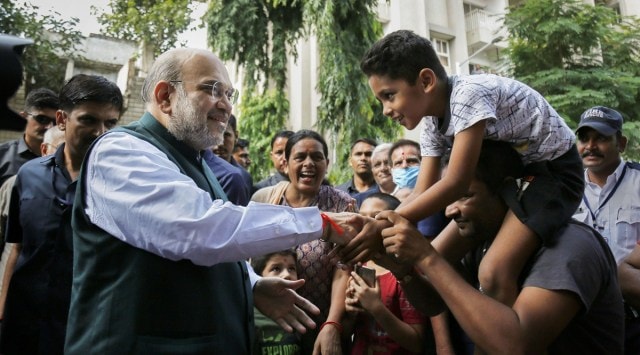States should modernise jails, prison reforms law coming: Amit Shah
The Union Home Minister also called for a rehabilitative view of prisoners and jails, saying India’s incarceration system is prone to abuse because it was set up by the British to subjugate political prisoners.
 Home Minister Amit Shah inaugurates a school in Ahmedabad on Sunday. (PTI)
Home Minister Amit Shah inaugurates a school in Ahmedabad on Sunday. (PTI)Union Home Minister Amit Shah Sunday asked all states to modernise their prisons and said that a new law on jail reforms is coming soon.
He also called for a rehabilitative view of prisoners and jails, saying India’s incarceration system is prone to abuse because it was set up by the British to subjugate political prisoners.
Shah was speaking after inaugurating the All India Prison Duty Meet, a three-day event in Ahmedabad. Gujarat Chief Minister Bhupendra Patel and Home Minister Harsh Sanghavi, among others, were present.
At the event, Shah said the jail department is a major component of the nation’s internal security and should not be neglected.
“There is a need to make jails modern and technologically adept with stringent security measures, and to introduce better living and health facilities, libraries, and training programmes for prisoners to help them get back to society and initiatives to promote mental development. It is very important that the states give a lot of value to prisons. For that reason, the Narendra Modi government in 2016 introduced the ‘Model Prison Manual’ to replace the existing prison manual after a lot of discussion on these aspects. Only 11 states and Centre-administered Union territories have adopted the new manual. I urge other states to accept the new manual without delay for prison reforms,” said the Union Home Minister.
In the manual, Shah said, the government considered aspects such as human rights, the rehabilitation of prisoners in society, the rights of female prisoners, laws for prison inspection and the right to education even for death row convicts.
“I would also urge the states to introduce the facility of video conferencing for courts in at least every district jail. The new manual also has provisions to stop gangs in jail and keep those involved in radicalisation or those involved in narcotics cases in separate areas in jail.”
Shah said that the government is also in talks with states to introduce a model Act for the prison system. “This will bring changes to the Act made by the British and I am confident that within the next six months, we will be able to bring the act to the table,” he said.
Shah said not everyone jailed today is criminal by nature and could be a victim of circumstance.
“There is a need to change the view with which prisons are seen in our society. Not every prisoner is a criminal by nature. Many times, some incidents happen, and they get involved in various criminal acts and subsequently get punished for them. For a society to be fit and fine, the clause of punishment is important. If there is no punishment, then there will be no fear and if there is no fear, there will not be any discipline and without discipline, we cannot imagine a healthy society. Punishment is necessary for society. However, it is the responsibility of the jail administration to ensure that jails become a medium for such people who are not ‘born criminals’ or ‘criminals by nature’ to get back to society.”
“Of those who are convicted, 90 per cent of them are those who return to society and it is very important. I am not saying this from a humanitarian point but this is also very important from a law-and-order perspective,” said Shah.
The Union Home Minister said that prisons in India were a neglected area and that there are many states where they are still functioning in the manner in which they were made by the British. “Back in the British regime, a majority of people sent to jails were political prisoners and torture became a tool for the British to maintain their regime. There is a need for revaluation of our viewpoint of jails,” added Shah.
As per the National Crime Records Bureau’s 2021 statistics, there were a total of 5,54,034 people in prisons across India, as against a capacity of 4,25,609. A similar trend of overcapacity was seen in 2020 and 2019 as well.
The prisoner occupancy rate in all 32 Gujarat jails in 2021 was 118%. In 2020, it was at 110.6%. A total of 11,599 prisoners in the state are undertrials while 4,626 are convicts, the data show. The total capacity of Gujarat jails is 13,999.







